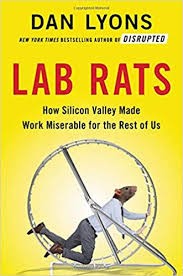by Christian Boyles

Lab Rats: How Silicon Valley Made Work Miserable for the Rest of Us
by Dan Lyons
HD58.7 .L96 2018 | This title is also available electronically
At a time of soaring corporate profits and plenty of HR lip service about “wellness,” millions of workers–in virtually every industry–are deeply unhappy. Why did work become so miserable? Who is responsible? And does any company have a model for doing it right?
For two years, Lyons ventured in search of answers. From the innovation-crazed headquarters of the Ford Motor Company in Detroit, to a cult-like “Holocracy” workshop in San Francisco, and to corporate trainers who specialize in … Legos, Lyons immersed himself in the often half-baked and frequently lucrative world of what passes for management science today. He shows how new tools, workplace practices, and business models championed by tech’s empathy-impaired power brokers have shattered the social contract that once existed between companies and their employees. These dystopian beliefs–often masked by pithy slogans like “We’re a Team, Not a Family”–have dire consequences: millions of workers who are subject to constant change, dehumanizing technologies–even health risks.
A few companies, however, get it right. With Lab Rats, Lyons makes a passionate plea for business leaders to understand this dangerous transformation, showing how profit and happy employees can indeed coexist.
Is it checked out? Don’t worry about it. Here are some other titles on the subject.
The High-Speed Company : Creating Urgency and Growth in a Nanosecond Culture
HD30.28 .J458 2015
No one knows the ins and outs of successful companies better than bestselling author Jason Jennings. Back in 2001, with It’s Not the Big That Eat the Small, It’s the Fast That Eat the Slow, Jennings proved that speed was the ultimate competitive advantage. But in 2015, companies of all sizes still struggle to adapt quickly. They know it’s crucial to their future but need help to get everyone implementing speed and urgency at all levels.
Jennings and his researchers have spent years up close and personal with thousands of organizations around the world—figuring out what makes them successful in both the short and long term. He understands the real challenges that keep more than eleven thousand CEOs, business owners, and executives up at night. And he knows how the best of the best combine speed and growth to deliver five times the average returns to shareholders.
The High-Speed Company reveals the unique practices of businesses that have proven records of urgency and growth. The key distinction is that they’ve created extraordinary cultures with a strong purpose, more trust, and relentless follow-through. These companies burn less energy, beat the competition, and have a lot of fun along the way.
Bad Blood : Secrets and Lies in a Silicon Valley Startup
HD9995.H423 U627 2018
In 2014, Theranos founder and CEO Elizabeth Holmes was widely seen as the female Steve Jobs: a brilliant Stanford dropout whose startup “unicorn” promised to revolutionize the medical industry with a machine that would make blood testing significantly faster and easier. Backed by investors such as Larry Ellison and Tim Draper, Theranos sold shares in a fundraising round that valued the company at more than $9 billion, putting Holmes’s worth at an estimated $4.7 billion. There was just one problem: The technology didn’t work.
A riveting story of the biggest corporate fraud since Enron, a tale of ambition and hubris set amid the bold promises of Silicon Valley.
The Know-It-Alls : the Rise of Silicon Valley as a Political Powerhouse and Social Wrecking Ball HD9696.2.U62 C64 2017
In The Know-It-Alls former New York Times technology columnist Noam Cohen chronicles the rise of Silicon Valley as a political and intellectual force in American life. Beginning nearly a century ago and showcasing the role of Stanford University as the incubator of this new class of super geeks, Cohen shows how smart guys like Jeff Bezos, Peter Thiel, Sergey Brin, Larry Page, and Mark Zuckerberg fell in love with a radically individualistic ideal and then mainstreamed it. With these very rich men leading the way, unions, libraries, public schools, common courtesy, and even government itself have been pushed aside to make way for supposedly efficient market-based encounters via the Internet.
Donald Trump’s election victory was an inadvertent triumph of the “disruption” that Silicon Valley has been pushing: Facebook and Twitter, eager to entertain their users, turned a blind eye to the fake news and the hateful ideas proliferating there. The Rust Belt states that shifted to Trump are the ones being left behind by a “meritocratic” Silicon Valley ideology that promotes an economy where, in the words of LinkedIn founder Reid Hoffman, each of us is our own start-up. A society that belittles civility, empathy, and collaboration can easily be led astray. The Know-It-Alls explains how these self-proclaimed geniuses failed this most important test of democracy.
